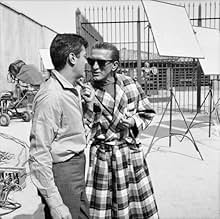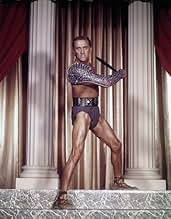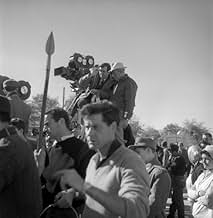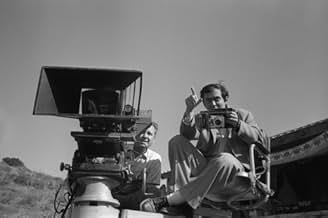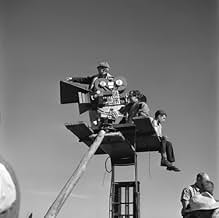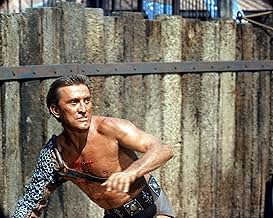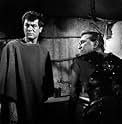Spartacus
- 1960
- Tous publics
- 3h 17m
The slave Spartacus survives brutal training as a gladiator and leads a violent revolt against the decadent Roman Republic, as the ambitious Crassus seeks to gain power by crushing the upris... Read allThe slave Spartacus survives brutal training as a gladiator and leads a violent revolt against the decadent Roman Republic, as the ambitious Crassus seeks to gain power by crushing the uprising.The slave Spartacus survives brutal training as a gladiator and leads a violent revolt against the decadent Roman Republic, as the ambitious Crassus seeks to gain power by crushing the uprising.
- Won 4 Oscars
- 12 wins & 11 nominations total
Summary
Featured reviews
Filmed in a grand scope and in such great detail, Spartacus is eye candy for fans of epic film making. I can only imagine what the film would have been like if he had total control over the project. Kirk Douglas is the man as Spartacus, Tony Curtis is quite good as his sidekick, Charles Laughton is wise and witty as the elder senator, Peter Ustinov is a hoot in his role as the poor victim of fortunate (and unfortunate) circumstance and Sir Laurence Olivier shows why he was the premier actor of his day as Crassus.
Highly recommended for Kirk Douglas fans and Stanley Kubrick philes.
Overall, maybe not Kubrick's very best, but a fine historical epic. 9/10 Bethany Cox
It would be well-nigh impossible now to assemble a cast of such substance and quality. There were bound to be clashes of temperament of course and the animosity between Olivier and Laughton has been amusingly recounted by Peter Ustinov who picked up an Oscar as Best Supporting actor. Olivier here is in his physical prime and is magnificent in the role of Crassus. He is ruthlessness incarnate but tender in his scenes with the Lavinia of Jean Simmons. He had previously directed her in 'Hamlet' and their professional bond is palpable.
There are scenes which are indelibly etched notably the gladiatorial combat between Douglas and Woody Strode and the scene where the slave army watches the legions of Crassus forming for battle which must surely have been inspired by Eisenstein's 'Alexander Nevsky'. The score by Alex North although harsh captures perfectly the brutality of the times whilst Russell Metty's cinematography is outstanding.
Forget the others, this is the only gladiator film that really matters and it will never be surpassed.
Did you know
- TriviaStanley Kubrick was brought in as director after Kirk Douglas had a major falling out with the original director, Anthony Mann. According to Sir Peter Ustinov, the salt mines sequence was the only footage shot by Mann.
- GoofsA truck drives along the hills behind a battle scene.
- Quotes
Tigranes Levantus: If you looked into a magic crystal, you saw your army destroyed and yourself dead. If you saw that in the future, as I'm sure you're seeing it now, would you continue to fight?
Spartacus: Yes.
Tigranes Levantus: Knowing that you must lose?
Spartacus: Knowing we can. All men lose when they die and all men die. But a slave and a free man lose different things.
Tigranes Levantus: They both lose life.
Spartacus: When a free man dies, he loses the pleasure of life. A slave loses his pain. Death is the only freedom a slave knows. That's why he's not afraid of it. That's why we'll win.
- Crazy creditsThe six main cast members are accompanied by an item that represents their character (a chain, a Roman eagle, a wine jug, a couple of hands - one wielding a snake, and a sword).
- Alternate versionsAfter its premiere the film was heavily cut and wasn't shown in its complete form until 1991, when a restored version was re-released. Among the restored scenes is one where where Marcus Crassus (Laurence Olivier) tries to seduce Antonius (Tony Curtis) in the bath. The soundtrack was damaged, so Anthony Hopkins was called in to dub Olivier's lines. In addition, several scenes of violence preview audiences reacted to negatively were restored, including Crassus bloodily stabbing Draba, Marcellus being drowned in the stew, Spartacus stabbing a Roman soldier in the pool, and several gory shots in the final battle, notably Spartacus lopping off the arm of a Roman soldier.
- ConnectionsEdited into Hercule: Les Contemptibles (1997)
Details
- Release date
- Country of origin
- Official site
- Language
- Also known as
- Espartaco
- Filming locations
- Hearst Castle, San Simeon, California, USA(Crassus' villa)
- Production company
- See more company credits at IMDbPro
Box office
- Budget
- $12,000,000 (estimated)
- Gross US & Canada
- $1,830,650
- Opening weekend US & Canada
- $92,162
- Apr 28, 1991
- Gross worldwide
- $1,855,491
- Runtime
- 3h 17m(197 min)





